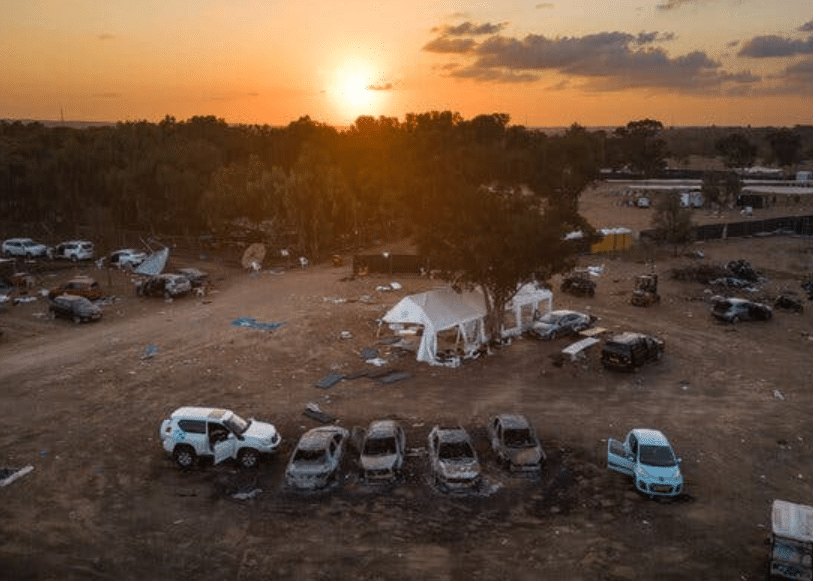A United Nations team has arrived in Israel to examine reports of sexual violence during the Hamas-led attack on Oct. 7 even as Hamas and some critics of Israel continue to reject evidence that such assaults occurred.
Israeli officials have said that Hamas terrorists brutalized women throughout their incursion into southern Israel and have complained that U.N. leaders and others have been slow to condemn sexual assaults.
The U.N. visit comes after multiple news organizations reported allegations of sexual violence during the Oct. 7 attack. In a Dec. 28 article, The New York Times documented a pattern of gender-based violence in the attack and identified at least seven locations where Israeli women and girls appeared to have been sexually assaulted or mutilated.
The U.N. team “aims to give voice to survivors, witnesses, recently released hostages and those affected; to identify avenues for support, including justice and accountability; and to gather, analyze and verify information,” said a statement issued Wednesday by the office of Pramila Patten, the U.N. secretary-general’s special representative on sexual violence in conflict, who is leading the visit.
While the Israeli government has welcomed Ms. Patten’s team, which arrived Sunday night, it has refused to cooperate with another U.N. body investigating Oct. 7 atrocities, accusing it of anti-Israel bias.
Hamas, which the United States and the European Union consider a terrorist group, denies that Palestinian fighters sexually assaulted women during the attack.
[The New York Times Report continues]
The police also said they found Sapir’s bag where she said she had been hiding, and women’s clothing near where she said the rapes occurred. And three severed heads were found farther away, near the bodies of assailants in military fatigues, Israeli officials said, without providing more detail.
In a separate interview, Yura Karol, 22, who was hiding next to Sapir, had told The Times he barely lifted his head but also saw a woman raped and killed while surrounded by armed men, some wearing military fatigues. Reached again last week, he repeated the account.
Asked why the Israeli police released only part of Sapir’s testimony, Mirit Ben Mayor, a police chief superintendent and spokeswoman, said, “We needed to show the world, which unbelievably didn’t believe us about sexual violence, and on the other hand, we needed to protect the investigation.”
The other witness who has been scrutinized is Raz Cohen, a security consultant who has described seeing a rape at a different location to several news outlets. Critics have questioned his credibility because he did not say he witnessed such an attack in his very first interviews with reporters, on Oct. 9.
Mr. Cohen started talking about witnessing rape in interviews the next day. He spoke to The Times in November, and said he saw five men in civilian clothes rape and kill a woman while he was hiding in a dried-up streambed.
Critics have pointed out that he went further in other interviews than he did with The Times to describe the terrorists as civilians.
A friend who was hiding with him, Shoam Gueta, also told The Times he saw a group of men sexually assault and kill a woman. Reached again last week, he repeated the account.
In his very first interviews with the media, Mr. Cohen described the terror of seeing people being massacred around him and hiding for his life. Asked this month why he had not mentioned rape at first, Mr. Cohen cited the stress of his experience, and said in a text message that he had not realized then that he was one of the few surviving witnesses. He declined to be interviewed again, saying he was working to recover from the trauma he suffered.
Kateryna Busol, a Ukrainian lawyer specializing in international law, including crimes against women, said a slight variation in eyewitness testimony “does not necessarily invalidate the witness’s experience.”
“It’s natural after such a traumatic experience to have certain blind spots and to fluctuate in the way certain aspects of the event are remembered,” she said.
The Times article also described visual evidence and interviews with witnesses, soldiers and volunteer medics who together said they found more than 30 bodies of women and girls with signs of sexual violence or mutilation, including at kibbutzim and military bases struck by heavily armed gunmen wearing combat fatigues.
The Israeli police have acknowledged that, during the shock and confusion of Oct. 7, they did not conduct autopsies or collect other forensic evidence. Experts say it is not unusual for such evidence to be minimal in cases of wartime sexual violence.
The Times article described the case of Gal Abdush, a mother of two who was killed along with her husband after fleeing the rave, and her family’s anguish over the uncertainty. Based on video of how her body was found, Israeli police officials said they believed she had been raped, and some members of the Abdush family said they feared the same.
“It seems to me, and I really hope I’m wrong,” said Zvika Alter, a brother-in-law, in early December, “that she was raped.”
Since the publication of the Times article, a few family members have denied or cast doubt on that possibility, including another brother-in-law who said he spoke to Ms. Abdush’s husband before he was killed. Critics have also seized on an Instagram comment by Miral Alter, Zvika’s wife and one of Ms. Abdush’s sisters, suggesting that The Times misled the family about the focus of the article.
Ms. Alter, whom The Times had not interviewed before the article was published, deleted the comment shortly after posting it. But critics circulated images of it to assert falsely that the family had renounced the article.
Last week, Ms. Alter told the Times that she was upset her post had been used to question whether Hamas sexually assaulted women and that when she made it, she had been “confused about what happened” and was trying to “protect my sister.”
“Did she suffer? Did she die right away?” she said. “I want to hope she didn’t suffer, but we will never know.”
In addition to the work of the U.N. team now in Israel, several investigations into the allegations of sexual violence are unfolding. The Israeli police have been collecting information. So has a civil commission led by Israeli academics. And a separate U.N. commission has called on the public to submit information.
Israeli activists and their allies abroad have expressed anger over what they consider the U.N.’s slow response. “Me too, unless you’re a Jew!” protesters have shouted at demonstrations in Tel Aviv.
The U.N. team led by Ms. Patten plans to spend about two weeks in Israel and the occupied West Bank interviewing witnesses and analyzing medical and forensic information. Ms. Patten’s office said she will share some initial findings after the mission ends in mid-February, with additional information expected to be included in her office’s annual report on sexual violence in conflict.
Isabel Kershner contributed reporting from Jerusalem.

